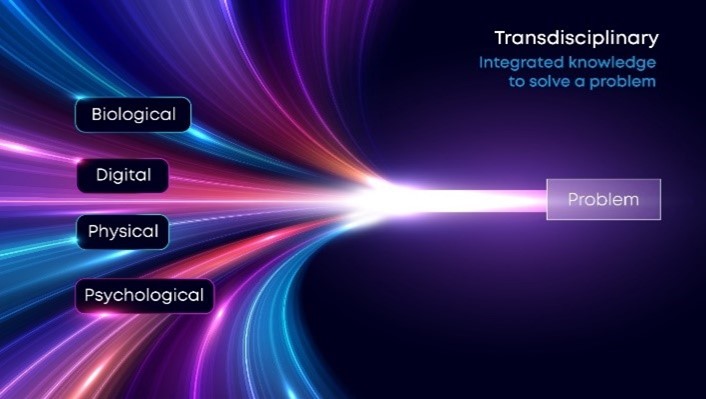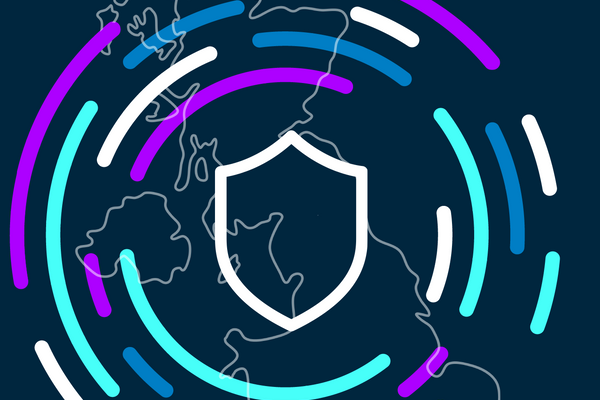Transcending boundaries; the future of national security
The future for national security is transdisciplinary. No single discipline can hope to solve all the complex, multifaceted challenges alone. Transdisciplinary is a particularly apposite term here, in that it encompasses not just the knowledge drawn from different disciplines, but the integration of it in a way that transcends traditional boundaries to solve a problem.
If the UK is to remain prosperous and safe – taking a leading role in propelling opportunities rather than reacting to threats – we must embrace this emerging and accelerating trend in technology innovation, where humans, machines and environment are becoming interoperable. This interoperability transcends physical, biological, psychological and digital boundaries.

Double-edged sword
The opportunities from such interoperability are vast, meaning we could benefit from autonomous systems, advanced therapeutics, and a better knowledge of life’s intricacies. But novel threats also arise from this convergence.
Autonomous systems (which can be defined as a set of agents able to meet a set of common goals through some form of decision making) are an example. They can allow for augmentation of human effort, taking on tasks that are too dangerous or onerous. But without safeguards to ensure their safety and security, they may very well display emergent aberrant behaviour that could end up endangering the very lives that they are supposed to augment.
We can see examples of threats today in emergent behaviour where AI bots learn their own unintelligible-to-humans language, where LLMs (large language models) can be queried freely, or even weaponised, to give knowledge on synthesising deadly viruses. Then there’s the deaths that could conceivably occur because self-driving vehicles have been hacked and weaponised. Since such threats are transdisciplinary, so safeguards need to be transdisciplinary. Human psychology, human physiology, emergency response, engineering, computer science and more all play key roles in creating the necessary assurance.

We can also explore the near future with systems that integrate more deeply with the human body. A prominent technology that has captured public imagination is the brain-computer interface. It’s been demonstrated in anything from vehicle control to deep-brain stimulation that helps someone to walk again. Novel threats arise from injected signals into the interface which could conceivably affect personhood, from the hijacking of intelligent prosthetics, to eavesdropping on neural information. This has given rise to studies into the new field of neurosecurity.
Hints of the long-term effect of the interoperability between different disciplinary worlds can be seen in a case study where computer malware was encoded as DNA, before taking control of a gene sequencer. Can we create a computer virus scanner for biological DNA? What are the implications for bio-hazard labs around the world?
These examples are also set against the larger backdrop of growing complexity – whether that be smart infrastructure, Finance 4.0 (a posited framework using decentralised technology, IoT and AI to enable a socio-ecological paradigm) or Industry 5.0 (which integrates domains such as manufacturing with AI and human-centricity). These convergences could also lead to developments which outpace standalone technologies – leading to a much more dynamic threat landscape.
Humans are a strength
There is only one constant emerging from this assortment of buzzwords – the human. Humans will still be users, creators, approvers, maintainers and enforcers. So, to mitigate against threats and maximise opportunity, the human will be critical in a transdisciplinary world.
There have been numerous references to humans being the weakest link when it comes to security. This is erroneous. Instead, we could turn this concept on its head and design systems which understand humans. But to do that we need that melding of physical, biological, psychological and digital. This will help to pre-empt some of the complex risks, identify novel threats and develop novel mitigations – whether that is in infrastructure, in research and development facilities, or in teams and individuals.
Encouraging transdisciplinary diversity of thought has been shown to be pivotal, enabling better decision-making, in an ever-changing threat landscape. We can also augment through innovative use of AI, creation of transdisciplinary training programmes that cover the science, technology, engineering, arts and maths (STEAM) spectrum, and encouraging lateral thinking through funding for disruptive ideas.
As the world and the systems we depend on become increasingly complex, they also become opaque. My message is to start early and think big when deciding how to protect against systemic issues. Knowledge is power, and design principles and concepts such as forensic readiness can likewise be expanded to multiple integrated domains. This will ensure that we have all the information necessary to learn from errors, attribute accurately and defeat deception.
So, to sum up? The complexity of the coming national security landscape means that we should prepare across technology, process and people to ensure that we can safeguard against novel threats and take the most benefit from the opportunities that the transdisciplinary world affords. Overall, the emphasis should be on partnership, on collaborations and on pulling in the necessary knowledge, technologies and diverse, disruptive thinking from across academia, subject matter experts, technology start-ups and industry. No one discipline can solve the problem on its own, and neither can one person.
National Security updates
Sign-up to get the latest updates and opportunities from our National Security programme.






